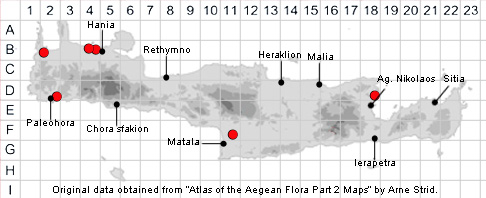
SPECIES DESCRIPTION
PLANTAGO INDICA
Family and Genus:- See- PLANTAGINACEAE/Subgen. PSYLLIUM
Common Names:- Branched plantain
Homotypic Synonyms:- Plantago arenaria, Plantago scabra.
Meaning:- Plantago (L) Foot-sole-like, (reference to the way the leaves lie flat on
the ground).
Indica (L) From India, Indian, Used loosely for the Orient.
General description:- Herbaceous annual plant.
Stems:-
1) Up to 50(-80) cm, erect, usually with ascending, straight branches, pubescent
with patent or ascending hairs, more or less minutely glandular above.
Leaves:-
1) Opposite, seldom whorled in 3's, simple, narrow, linear to lanceolate, entire or
denticulate, 8cm long at the most, covered with glandular hairs at their apex.
Flowers:-
1) Peduncles, 1-6 cm.
2) Spikes, 0·5-1·5 cm.
3) Bracts,
a) lowest, 2, 6-10 mm, with an herbaceous midrib and wide scarious margins,
ovate-orbicular with a linear-subulate apex, straight and suberect, with
divergent lateral veins at the base.
b) upper, 3·5-4·5 mm, ovate-orbicular or wider than long.
4) Sepals, unequal, the anterior 3·5-4 mm obovate-spathulate, the posterior 3-3·5
mm, ovate-lanceolate
5) Corolla-tube, 3·5-4 mm;
a) lobes, c. 2 mm, ovate-lanceolate, acute
Fruit:-
1) Capsule, c. 2 mm.
2) Seeds, c. 2·5 mm, cymbiform, oblong-elliptica in outline
Key features:-
1) Stems, with ascending branches, pubescent with patent or ascending hairs.
2) Lowest bracts, with orbicular-ovate base and linear-subulate apex.
Habitat:- Seasaonally wet, sandy, habitats, lake shores, fallow fields, along tracks.
0-300 m.
Distribution:- Scattered throughout Greece, but rare in the west. - C & S Europe N
Africa, SW & S Asia. Rare on Crete known from only a few scattered coastal areas
(see map).
Flowering time:- Apr to early July, sometimes later.
Photos by:- Courtesy of Wiki-Commons
